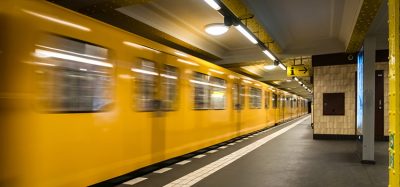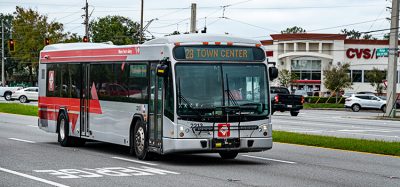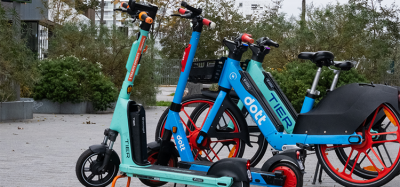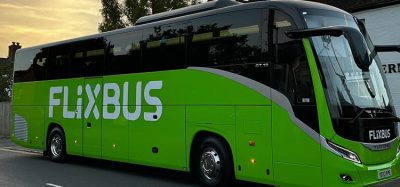All TfL buses meet emissions standards after huge retrofit
- Like
- Digg
- Del
- Tumblr
- VKontakte
- Buffer
- Love This
- Odnoklassniki
- Meneame
- Blogger
- Amazon
- Yahoo Mail
- Gmail
- AOL
- Newsvine
- HackerNews
- Evernote
- MySpace
- Mail.ru
- Viadeo
- Line
- Comments
- Yummly
- SMS
- Viber
- Telegram
- Subscribe
- Skype
- Facebook Messenger
- Kakao
- LiveJournal
- Yammer
- Edgar
- Fintel
- Mix
- Instapaper
- Copy Link
Posted: 15 January 2021 | Intelligent Transport | No comments yet
TfL has completed the retrofit of many of its older buses to meet or exceed Euro VI emission standards, with plenty more zero-emission vehicles on the way too.
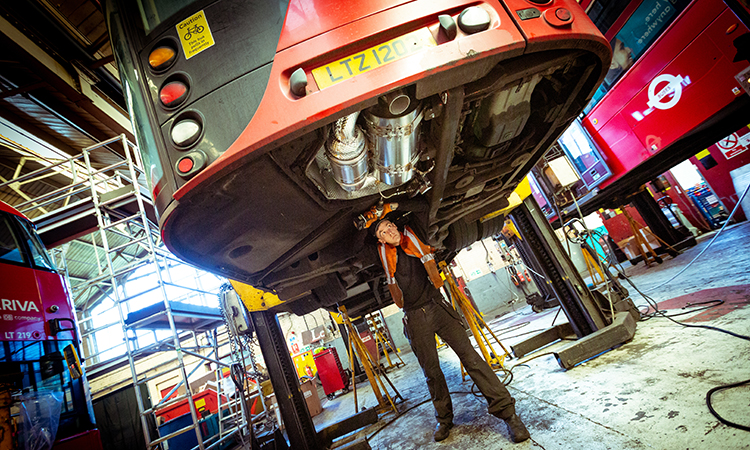

A Routemaster bus is retrofitted with a new ULEZ compliant exhaust at Clapton Bus Garage.
All buses in Transport for London’s 9,000-strong bus fleet now meet or exceed the cleanest Euro VI emissions standards, something the authority has called a major milestone in tackling toxic air pollution in the capital.
According to TfL, this has significantly reduced the contribution from London buses to transport-related NOx emissions, with the proportion of transport nitrogen oxide (NOx) emissions coming from TfL’s buses reducing from 15 per cent to just four per cent.
Since 2017, TfL says it has worked to phase out polluting diesel buses and to retrofit older buses with cleaner engines. Now completed, the scheme will see harmful NOx emissions from buses fall by an average of 90 per cent.
Around £85m has been invested in retrofitting older diesel buses to meet or exceed the Euro VI emissions standards since 2017. Each retrofitted bus emits up to 95 per cent less NOx emissions and 80 per cent less particulate matter (PM) than before, leading to significant air quality improvements across London.
As a key stage in the retrofit programme, 12 Low Emission Bus Zones were implemented in the capital between 2017 and 2019 to tackle the worst air quality hotspots outside central London, by concentrating cleaner Euro VI buses on the most polluting routes. The zones included high streets and town centres in Brixton, Haringey and Putney. The routes helped improve local air quality with a 98 per cent reduction in hourly exceedances on Putney High Street since 2016, previously one of the most polluted parts of the capital.
More than 400 all-electric buses have been introduced – including the UK’s first full routes of electric double decker buses – and around 300 additional zero-emission buses are expected to join the fleet by the end of this year. TfL continues to roll out electric buses, with plans for 2,000 all-electric buses to be in operation by 2025.
“London’s toxic air is a public health crisis causing premature deaths and stunting the growth of children’s lungs,” said Mayor of London Sadiq Khan.
“Today, as part of our work to tackle the twin dangers of toxic air pollution and the climate emergency, I am proud that the entire TfL core bus fleet now meets the strictest emissions standards.
Claire Mann, Director of Bus Operations at TfL, said: “Londoners deserve to breathe clean air. Toxic air kills, reduces life quality and, as the pandemic has shown, leaves people more vulnerable to other threats.
“We’ve already seen how much retrofitted buses can clean up the air in busy London hotspots, and now with our retrofit programme complete on our core fleet the whole of the city will benefit from improved air quality.
“This programme has made our diesel buses as clean as they can be, but we are determined to go further. We will press ahead with our electrification programme and investments in other green technology to ensure all buses in London are zero emission by 2037 or hopefully, if additional financial support can be found, sooner.”
Related topics
Air Quality, Alternative Power, Fleet Management & Maintenance, Public Transport, Sustainable Urban Transport, Transport Governance & Policy
Related modes
Bus & Coach
Related cities
London
Related organisations
Transport for London (TfL)
Related people
Claire Mann, Sadiq Khan




